
Gwen's alien kiss - Torchwood - BBC
Gwen Cooper's first alien "contact". (TV: Day One)
Sexuality was the expression of sexual attraction or desire. This could be for an individual of a different gender or sex, of the same gender or sex, or even of a different species. It was a crucial aspect of the psychological examination of humans. (PROSE: Who Killed Kennedy) Sexuality was in truth the sum of a person's emotions, an amalgamation of their energy. (PROSE: Rags) This sexual passion was usually stemmed in the aesthetic beauty of the subject of desire. Vladimir Garudin regarded Dusha as "a Golden Fleece of womanhood", "so infinitely desirable, so infinitely powerful in her beauty". (PROSE: Emotional Chemistry)
It began as, in the words of the Seventh Doctor, "the urge for the alpha-being to mate with other alpha-beings whenever possible, to fight wherever not." (PROSE: Death and Diplomacy)
The buttocks were a common focal point of sexuality. (PROSE: Just War, TV: The Unquiet Dead, End of Days) Jason Kane in Nights of the Perfumed Tentacle commented that he was in total control of his alien lover, as he knew what she wanted. (PROSE: Beige Planet Mars) Carys Fletcher used her sexuality to get into an exclusive bar; she simply kissed the guard, and he let her through. (TV: Day One) In this fashion, sexuality was power.
Sexuality could serve as power in a literal sense too, though. The Sex Gas belonged to a species that fed off orgasmic energy. It therefore came to 21st century Earth, a culture that could easily satisfy its sexual needs, and took over Carys Fletcher. From within Carys' body, she had sex with nearly every man she came across, killing them and turning them to dust in the process. When Gwen Cooper, attracted to the gaseous entity's increased pheromones, began kissing Carys, though, she pulled away — "It has to be a man." (TV: Day One)
Bernice Summerfield found solace in sexual thoughts and dreams when she was feeling lonely or unloved. (PROSE: Death and Diplomacy)
Bernice noted that her husband Jason Kane had "turned himself into a doll for aliens to pleasure themselves with", and had essentially made himself into a product to be consumed by selling pornographic accounts of his encounters "for random strangers to wank over". (PROSE: Sex Secrets of the Robot Replicants)
An android duplicate of Jason — under the alias of Professor Cockshaft — lectured that "Mr Kane's work treats sex as an erasure of the boundaries between the familiar and the foreign, the self and the not-self." Benny, watching the presentation, concurred — the main source of attraction to Jason for her was how different he was to her. (PROSE: Sex Secrets of the Robot Replicants)
Fitz Kreiner once had a dream in which he rubbed buttocks with the Eighth Doctor. When he queried this dream-state Doctor, he was assured that it was not "[his] subconscious telling [him] anything about [his] sexuality." (PROSE: Halflife)
As the Tenth Doctor suggested to Chris Pirelli, teenagers were often confused about their sexuality. He called this "teenage angsty stuff". (PROSE: Forever Autumn) Bernice Summerfield thought that one must at least have suspicions about their sexual preferences by the age of fifteen. (PROSE: Death and Diplomacy) She was glad she'd never have to be a teenager again after meeting Emile Mars-Smith, obviously gay, though he didn't yet know this himself. In fact, Emile never gave it much thought until Tameka Vito confronted him about it. He was at first shocked his sexuality was so obvious, and only then admitted it to himself. He realised that he'd truly known all along:
He wanted to wear the mask for ever. They knew he was gay. Bernice. Tameka. All of them. And now he knew too.
He'd always known of course, deep down, but somehow he'd managed to avoid actually admitting it to himself. Somehow he managed to keep his thoughts and feelings apart. He'd fancied boys. Oh, he'd ached after a couple of boys who lived on the relay station. Fallen into month-long depressions when they'd moved away or met girls. But he'd never thought about it consciously. Never let himself acknowledge it.
How the hell had he managed that? How had he lived like that? Was he so screwed up that he didn't even know what he felt?
He'd been such a liar.
Even people who identified as heterosexual have been shown to have occasional same-sex tendencies, proving that sexuality was fluid. (TV: Everything Changes, Greeks Bearing Gifts) David Daniels had reportedly "slept with enough straight men to know that hope never died", and did not take someone's choice of category to mean much of anything. (PROSE: Damaged Goods) As Jack Harkness commented to Toshiko Sato upon viewing heterosexual Gwen Cooper kissing Carys, "You people and your quaint little categories." (TV: Day One)
No matter how one identified, they could still derive sexual pleasure from watching people of another orientation. For instance, Fern "touched himself" while watching pornography that depicted sex between a man and a woman, two women, and two men. (PROSE: A Rose by Any Other Name) Owen Harper recorded Gwen Cooper's kiss with Carys Fletcher for later, calling it a "treat". (TV: Day One)
History
According to the Seventh Doctor, the ancient Greeks and Romans linked war with homosexuality. (PROSE: Death and Diplomacy) Though many rumours claimed that William Shakespeare was homosexual, the Ninth Doctor assured Rose Tyler that he was "very straight". He was, in the words of Rose, "hitting on [her]", (COMIC: A Groatsworth of Wit) and did the same with Martha Jones. Despite this, Shakespeare still flirted with the Tenth Doctor as well, who commented, "57 academics just punched the air." (TV: The Shakespeare Code)
The Ninth Doctor also implied that Christopher Marlowe was interested in men; (COMIC: A Groatsworth of Wit) in fact, Marlowe flirted extensively with Steven Taylor. (PROSE: The Empire of Glass)
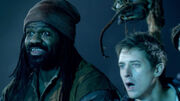
Dancer and Rory obsess over the Siren. (TV: The Curse of the Black Spot)
According to Bernice Summerfield, the 1880s "weren't as enlightened" as her time when it came to sexuality. (PROSE: All-Consuming Fire) Around the 1890s, Warren Gadd targeted gays, and attempted to blackmail Oscar Wilde by threatening to reveal his secret. (AUDIO: Beautiful Things) Vastra and Jenny Flint were married by Christmas of 1892. This couple was not only same-sex, but different species — Vastra was a Silurian, while Jenny was a human. (TV: The Snowmen) An inspector the two worked with could barely take this in. (TV: Vastra Investigates: A Christmas Prequel)
Another female same-sex couple around this time was that of Torchwood Three members Alice Guppy and Emily Holroyd. (TV: Fragments) In 1869, Gwyneth called Rose Tyler, who was native to the 21st century, "some kind of wild thing" for expressing the criteria she used in picking boys: "good smile, nice bum." (TV: The Unquiet Dead)
In the 1920s, Roger Curbishley was forced to keep his relationship with Davenport secret, (TV: The Unicorn and the Wasp) and Angelo Colasanto was not allowed to join the Three Families because he did not hide his with Jack Harkness. (TV: End of the Road) According to the Seventh Doctor, gays were sent to concentration camps during World War II, along with anyone else even slightly different. (PROSE: Timewyrm: Exodus)
In and around the 1950s, sex in general was somewhat tabooed. Emma-Louise Cowell's mother would tell her that "no man wants to marry soiled goods." Sex was generally only performed with spouses, although some people like Diane Holmes, who claimed to "not exactly [be] marriage material", had lovers. While Owen Harper was under the impression that the '50s were uptight and sexually repressed, Diane assured him, "You didn't invent it, you know." (TV: Out of Time)
In 1940s Britain, homosexuality was viewed as heavily abnormal, and Jack shocked everyone around him by dancing with and kissing another man at a goodbye dance at The Ritz. Heterosexuals at that dance, though, had no problem even having mild sex in public; there was indeed a "lover's corner" intended for just this. (TV: Captain Jack Harkness) Alan Turing was persecuted for his homosexuality, but strongly believed that it was unalterable and perfectly natural. (PROSE: The Turing Test)
The gay minority was persecuted well into the 1960s, (AUDIO: The Cold Equations) Canton Delaware getting kicked out of the CIA for wanting to marry a black man. (TV: Day of the Moon) Companion Oliver Harper was facing arrest by the Metropolitan Police Service for his homosexuality when he first met the First Doctor in 1966. (AUDIO: The Cold Equations) Policewoman Barbara Redworth once saw the corpse of a homosexual, having been murdered by "queer-bashers". (PROSE: The Scales of Injustice) Bob Campbell linked homosexuality with illegal drugs, and called gays' lifestyles impermissible. (PROSE: The Devil Goblins from Neptune) In the 1990s, one version of Samantha Jones identified as the only person in her high school class that didn't think homosexuals "ought to be shot on sight". (PROSE: Alien Bodies)
By the early 21st century, though, homosexuality was more accepted, and children just accepted that some people had two mothers or two fathers. (TV: Children of Earth: Day One) April MacLean was able to say "good for you" when she found out Charlie Smith was gay, and no one took any issue with Charlie taking a boy to the prom. (TV: For Tonight We Might Die)
Homophobia still stuck around, though, and people like Rex Matheson maintained the prejudice. (TV: The Categories of Life) When Rex said, "The whole world got screwed because two gay guys had a hissy fit," Gwen Cooper replied, "Rex, get back in your cave." (TV: End of the Road) In 2016, Matteusz Andrzejewski's deeply religious Polish parents shouted at him and later grounded him for going to the school prom with a boy, Charlie. (TV: For Tonight We Might Die, The Coach with the Dragon Tattoo) Matteusz's parents subsequently kicked him out of the house because of his relationship with Charlie. (TV: Nightvisiting)
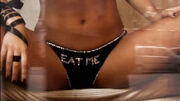
A 21st century advertisement shows off a nearly naked woman's body. (TV: Day One)
By this point, one did not need to be in love to have sex with someone; according to Gwen Cooper, "sex could just be about having a good time together." As Gwen elaborated, "as long as it's safe and between two consenting adults, no one cares." People had casual sex with "f*ck buddies", and pornographic magazines such as Peach were sold to the general public without consideration for children who might see them. (TV: Out of Time) People kissed in public, and sexualised advertisements marked nearly every shop window. (TV: Day One)
When John Ellis, Diane Holmes and Emma-Louise Cowell accidentally travelled from 1953 through the Cardiff Rift to 2007, both John and Emma were disgusted by what they saw. Emma expected to just have "a kiss and a cuddle" with a guy she met at a bar, but then found out that he wanted more. Diane, however, was perfectly comfortable with the 21st century attitude towards sex, as she had held much the same attitude in '53. (TV: Out of Time)
Internet chat rooms existed for people craving sexual partners online. DrLuvin entered the channel #areyoulonely, thinking from the title it was a sexual nature. He wanted to know what Shirley1968 was wearing, if it was something cute, hoping it was something tight-fitting and "slinky". (PROSE: Lonely)
Around 2030, Fiona, or "Fee", was indifferent about people's sexual preferences, commenting, "Fine, if that's what turns them on," after being told that two women were lesbians. (PROSE: Warchild) Yuri Kerenski told a story about his brother Mikail and his husband to Maggie Cain in 2059. (TV: The Waters of Mars) In the 26th century — the home era of Professor Bernice Summerfield — bisexuality was the norm. (PROSE: All-Consuming Fire)
Benny, on the other hand, was fortunate in that the people of her own time had by and large developed a happy and relaxed and generally unobtrusive ambisexuality. She had read of such human aberrations as homo- and lesbophobia in the course of her historical studies, but, like the vast majority of her contemporaries, she had never been able to understand how the people in history could have made such a big deal of such things.
Steven Taylor, who came from sometime between the 22nd century and the 41st, (AUDIO: Return of the Rocket Men, TV: The Daleks' Master Plan) told Oliver Harper of the 1960s, "In my time, [homosexuality] doesn't matter. No one thinks twice about it." He laughed when he realised that something like sexuality was Oliver's reason for fleeing his world in the TARDIS — "why would it be [illegal]?" he asked rhetorically. (AUDIO: The Cold Equations) Chris Cwej, from the 30th century, noted that his society had many sex-related problems, but only "once in a blue moon" did they involve sexual orientation. (PROSE: Damaged Goods) The taboo simply did not exist. (AUDIO: Damaged Goods)
The people of the 51st century were sexually active with not only more than one gender, but in fact many different non-human species. John Hart even found himself attracted to an Earth poodle. (TV: Kiss Kiss, Bang Bang) As the Ninth Doctor quipped, "So many species, so little time." He explained to Rose Tyler that they were "just a bit more flexible when it [came] to dancing." (TV: The Doctor Dances) Jack Harkness, a native of this century, would "shag anything if it's gorgeous enough" according to Toshiko Sato. (TV: Day One)
The Thin One and the Fat One declared proudly that they were the "Thin/Fat Gay Married Anglican Marines". (TV: A Good Man Goes to War) By the year 5,000,000,053, same-sex couples were just as common as opposite-sex ones, and both were unremarkable, although New Earth Cat Thomas Kincade Brannigan jokingly called partners Alice and May Cassini sisters, claiming to be old-fashioned. (TV: Gridlock)
Human sexuality
Heterosexuality
Heterosexuality was sexual attraction to people of the opposite gender. Heterosexuals were often known as straights. Such was considered the norm into the 21st century. Bernice Summerfield noted that religious texts made heterosexuality compulsory, something which she found maddening. (PROSE: Beyond the Sun)
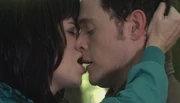
Gwen and Owen give in to their sexual tension. (TV: Countrycide)
Creed McIlveen felt drawn to images of young women who were "limber and tanned", and traced the legs of one with his salivated finger. (PROSE: Warlock) Jack Harkness noted that Gwen Cooper had "all the right curves in all the right places". (TV: Day One)
Gilgamesh, king of Uruk, had a substantial sex drive, and many women reportedly felt "honoured" to sleep with him according to Avram. He could essentially pick whom he wanted, though he knew to stay away when he was not wanted. (PROSE: Timewyrm: Genesys)
When Gwen and Owen had to hide together in a storage space to hide from Lisa Hallett, their closeness drew Owen to kiss her. She later intimated that "I could feel your hard on." (TV: Cyberwoman) They soon began an affair, much to Gwen's guilt. When Toshiko Sato listened in on their thoughts, they had had sex two times already that day, Gwen was considering taking him down to the Vaults for a third, and Owen was getting aroused by the thought of Gwen's tongue running across his teeth. After Gwen called their affair off, Owen yelled out, "I was getting bored of your f*ck tricks anyway." (TV: Combat)
Amy Pond did not look away as the newly-regenerated Eleventh Doctor got fully naked and changed into his new outfit at Royal Leadworth Hospital. (TV: The Eleventh Hour) She later attempted to have sex with him. (TV: Flesh and Stone)
A young Blondie programmed a hologram to appear as a ten-centimetre woman named Tinkerbell, whom he kept in his locker. It took him thirty-six hours to complete, but his teenage libido urged him on. (PROSE: Transit)
The Master married a human woman named Lucy Cole who was in favour of his evil actions, but fell out of love with him when their relationship became abusive. (TV: Last of the Time Lords) He also implied an attraction to his female incarnation. (TV: The Doctor Falls)
Homosexuality

Captain Jack kisses Captain Jack - Torchwood - BBC
Captain Jack Harkness kisses Captain Jack Harkness, much to the surprise of their 1940s audience. (TV: Captain Jack Harkness)
Homosexuality was sexual attraction to people of the same gender. According to the Seventh Doctor, some people believed that certain genes lead to homosexuality. (PROSE: Utopia) Alan Turing maintained that "my condition is an unalterable and natural, if variant, behaviour... but this axiom is in direct conflict with that held with equal certainty by others." (PROSE: The Turing Test)
Jack Harkness was perfectly capable of detecting homosexuality in others, in order to choose his mates. "[It's] just [through] experience, that's all." He expressed to Angelo Colasanto, though, that others would not discover should he not choose to share. (TV: Immortal Sins)
Homosexuals were forced to endure homophobia, something which Bernice Summerfield — and everyone else from her home period of the 26th century — could not understand. (PROSE: Sky Pirates!) Words used to describe and insult homosexuals included gay, queer, poof, fairy and faggot. (TV: Children of Earth: Day Four, PROSE: Endgame, Death and Diplomacy, Timeless, Blue Box, The Forgotten Son, et. al) Benny later referred to her son, Peter Summerfield, as being gay. (PROSE: Big Bang Generation)
Christianity denounced homosexuality, leading Angelo Colasanto to believe that God "doesn't hear me". (TV: Immortal Sins)
In the 1890s, George Litefoot expressed the hope that homosexuals such as Oscar Wilde and Warren Gadd's victims would be able to practice their love freely in a more enlightened time in the future. (AUDIO: Beautiful Things)
In 1960s Britain at least, homosexuality was a crime punishable by law (as Alan Turing experienced), but Steven Taylor — from centuries later — retorted, "Why would it be [illegal]?" The Doctor, for his part, commented in his first incarnation, "I shall say it's society's crime, not [referring to Oliver Harper] yours." (AUDIO: The Cold Equations)
Homosexuality was far more accepted on Rhodia than on Earth. Even in the 21st century, Matteusz Andrzejewski's deeply religious Polish parents shouted at him and later grounded him for going to the school prom with a boy, Charlie Smith. (TV: For Tonight We Might Die, The Coach with the Dragon Tattoo)
Some heterosexuals found homosexuality daunting, and "Chick" Peters was forced to tell Ace to "relax; you're not my type." (PROSE: Blue Box)
Homosexuality also meant to heterosexuals that the person was unavailable. It was thus an undesirable trait. Samantha Jones complained to Ramadan that "the good‐looking ones are always gay." (PROSE: Seeing I) When Donna Noble was brought to a party on 8 December 1926, she was disappointed that both Davenport and Roger Curbishley were gay — "Typical. All the decent men are on the other bus." (TV: The Unicorn and the Wasp) Tallulah mistakenly thought the Tenth Doctor was "[such] a waste" because he was "into musical theatre." (TV: Daleks in Manhattan) When April MacLean found out that Charlie was gay, she remarked, "Of course he is," disappointed. (TV: For Tonight We Might Die)
Some associated certain stereotypes with homosexuality, including being "into musical theatre". (TV: Daleks in Manhattan) During a discussion on Jack Harkness with his Torchwood Three colleagues, Owen Harper voiced his belief that he must be gay, saying that "period military is not the dress code of a straight man." (TV: Day One)
Growing up, Amy Pond believed her best friend Rory Williams to be a homosexual as he never showed any interest in girls in her mind. However, she completely missed the fact that he was in love with her and thus had only been paying her attention since they were children until their friend Mels, their future daughter, pointed out that Rory was in love with her. When Rory learned that Amy thought he was gay, he ran out of the room chased by Amy once she realised the truth. (TV: Let's Kill Hitler)
Bill Potts had a crush on a girl who attended the Twelfth Doctor's lectures, giving her extra chips at the university canteen. Her interest seemed to cease when the extra chips eventually caused her to become overweight. Bill also developed an interest in another young woman, Heather, (TV: The Pilot) whom she eventually kissed and travelled the universe with. (TV: The Doctor Falls) Her virtual self also briefly developed a crush on a woman called Penny. (TV: Extremis) Her real self eventually did the same thing with the real Penny. (TV: The Pyramid at the End of the World)
Bisexuality
Bisexuality was sexual attraction to both sexes. Gwen Cooper thought that being bisexual must be great — "best of both worlds" — but Ianto Jones, who identified as one, said it made him feel insecure, like he belonged nowhere. (PROSE: The Twilight Streets)
Gwen herself, while predominantly heterosexual, expressed interest in her female hairdresser. (AUDIO: Love Rat) Toshiko Sato, who took little time to fall for Mary, (TV: Greeks Bearing Gifts) was also interested in Owen. (TV: Reset, Exit Wounds, et al.)
Bisexuality was the norm in the 26th century. (PROSE: All-Consuming Fire)
Oswin Oswald, who lived in a time period beyond the 21st century, claimed to Rory Williams that the first boy whom she ever fancied was called Rory, but quickly admitted that "Actually, she was called Nina. I was going through a phase." (TV: Asylum of the Daleks)
As a teacher, Clara Oswald described Jane Austen to a class as a "phenomenal kisser", suggesting that Clara had shared some sort of experience with her. (TV: The Magician's Apprentice)
River Song was at least bisexual, as she had two wives in addition to the Doctor, Ramone and King Hydroflax as her husbands. (TV: The Husbands of River Song)
In an alternate timeline, Adric had a wife and children, and after her death he married a man. (AUDIO: A Full Life)
Exosexuality
Exosexuality, or xenophilia, was the sexual attraction towards members of other species. While not widely practised, exosexuality was oft thought of, and Jason Kane made a living selling pieces of literary xenopornography such as Nights of the Perfumed Tentacle, based off his own personal experiences. These erotic works were targeted at both humans and "aliens", and included several sex scenes between individuals of different alien species. (PROSE: Sex Secrets of the Robot Replicants, Beige Planet Mars, The Infernal Nexus) On a hen night in the 34th century, Andy Hansen noticed that inter-species couples were very common. (PROSE: The Three Faces of Helena)
Chris Cwej once found a xenopornographic magazine in one of the TARDIS' guest rooms, and was reminded of what he saw inside when he saw a gynoid giving birth. (PROSE: Christmas on a Rational Planet)
Jenny Flint and Vastra were exosexual, the pair being married. (TV: A Good Man Goes to War, The Name of the Doctor, Deep Breath)
Omnisexuality
Omnisexuality was the term that Jack Harkness applied to himself. As his boyfriend Ianto Jones explained, "it's the polite way of saying he'll sleep with anything — men, women... cephalopods." (PROSE: The House That Jack Built) Indeed, this was the norm in Jack's native 51st century — having spread out across the galaxy, humans began having sex with not only all genders, but many different alien species — "So many species, so little time." The Ninth Doctor explained to Rose Tyler that they were "just a bit more flexible when it [came] to dancing." (TV: The Doctor Dances) Toshiko Sato had "seen him in action", and assured her Torchwood Three colleagues that Jack would "shag anything if it's gorgeous enough". (TV: Day One) John Hart, a contemporary of Jack Harkness, even found himself attracted to a poodle, which he considered "gorgeous". (TV: Kiss Kiss, Bang Bang)
Another word for this was ambisexuality, which Bernice Summerfield applied to her culture, the humans of the 26th century. (PROSE: Sky Pirates!) Jason Kane, though from the 20th century, was also omnisexual, having relations with both genders while on Earth and with many different species after getting whisked away to the planet t'Kao at age fifteen. (PROSE: Death and Diplomacy)
I suppose there was Kara before I ran away from home, such as it was. And after that there was Beth. Then Danny, then Susan and Lisa. Lisa was something like forty-three – which I thought was really old – and she taught me quite a lot. And then there was Carla, then Sean and then the four months I spent living in Danielle, Mo and Susan's squat in Euston before they kicked me out. That was a different Susan. And then there was Kimberly and then Micqui and Justin, and then Peter and Carmel and then Louise, which was like this totally bad scene and got me on the mostly-celibacy kick which lasted the month or so until I was alien-abducted, which changed things quite a lot as you can probably imagine.
So, anyway, after that there was Rana, who was humanoid but more or less androgynous, and then I met Liva who wasn't humanoid but was what you might call definitively female; that was before Sali, of course, and after that there was Moiara and Kamo and Sai d'RaKosh and...
Vince Cosmos, a musician from the planet Glam brought up on 20th century Earth, also identified as ambisexual. (AUDIO: Vince Cosmos: Glam Rock Detective)
Other
Charles "Chick" Peters was born with both an X and a Y chromosome like a man, but his body did not respond to the hormones like it should have. He was brought up as a girl by his parents, and only found out his true identity at the age of fifteen. Chick did not have a womb. He dated women, and "never had any complaints" about his "female" body. Chick identified as a man, and did not consider himself a lesbian. (PROSE: Blue Box)
According to Kane, Avron Jelks' pieces occasionally went off on useless, sexual rants about "children, chainsaws and excrement". (PROSE: Burning Heart)
Jack on at least one occasion felt sexually attracted to a dog, Sheba. (PROSE: Warlock)
Sexuality in other species
Please help by adding some more information.
Not all species experienced sexuality in the same way humans did. Female Rills were sexually attracted to a giant skull, (PROSE: Galaxy Four) while the Delphons found the amputation of limbs sexually alluring. (PROSE: Lucifer Rising)
Some of the Sorvix in Cardiff were "xeno-curious", and had sexual relations with the human locals. (AUDIO: Love Rat)
Miss Quill was attracted to Coach Dawson's buttocks, and said she liked Mr Armitage. She kissed an android called the Inspector. (TV: The Coach with the Dragon Tattoo) She later referred to him as "the really quite hot dragon tattoo guy". (TV: Brave-ish Heart)
Obviously, species that reproduced asexually or that did not have distinct genders like Sloathes or Sontarans did not have sexuality at all, and could not understand the human concept. (PROSE: Oblivion, TV: The Time Warrior)
The Doctor
The Doctor himself was not explicitly prone to sexual attraction until his eighth incarnation. It was only then that he began feeling, not quite an urge, but the desire for more, for "the excitement of being close to someone, the need to exchange ideas on a more personal level, to be able to tell someone what you really believe" — romance. He stressed, though, that he'd only been feeling this urge "since I regenerated into this body", and told I.M. Foreman it wouldn't be fair on any of his companions to get involved sexually with them. (PROSE: Interference - Book Two)
Despite the Doctor's discussion about his "newfound" feelings, the Twelfth Doctor recalled that he had a long-time crush on the Master in his first incarnation, while at the Time Lord Academy. The Master was his first friend, and his "man-crush", who he thought was "so fast, so funny" and "always so brilliant". (TV: World Enough and Time) By the time the First Doctor regenerated, he had had "some experience with the fairer sex". (TV: Twice Upon a Time)
Further on, his fourth incarnation once openly referred to Romana I as being attractive, (TV: The Pirate Planet) and the First Doctor flirted with an Aztec woman named Cameca. (TV: The Aztecs)
At some point in his lifetimes, the Doctor built an android boyfriend and had difficulty getting rid of him. (TV: The Time of the Doctor) He once met an emperor made of algae that fancied him. (TV: Smile)
The Doctor's seventh incarnation, while in his John Smith guise, romanced and proposed to a human woman named Joan Redfern (PROSE: Human Nature) According to another account, the Tenth Doctor entered a similar human persona with another woman called Joan Redfern. (TV: Human Nature / The Family of Blood)
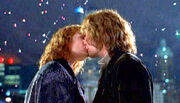
The Eighth Doctor kisses Grace goodbye. (TV: Doctor Who)
Still, though, the Eighth Doctor kissed Grace Holloway mere hours after his regeneration. (TV: Doctor Who) This incarnation was implied to have had sex with Bernice Summerfield (PROSE: The Dying Days, AUDIO: Benny's Story) and kissed Fitz squarely on the lips after finding out that he was still alive. (PROSE: Dominion) He even actively flirted with Fitz on occasion: "I'll show you my tattoo if you're lucky." (PROSE: Eater of Wasps) The Eighth Doctor eventually married a woman named Scarlette that was initially intended to bind him to Earth[statement unclear], but the union had deeper meaning for both individuals. Scarlette, who Sabbath stated was the only woman the Doctor ever got close to, eventually faked her death because she believed the Doctor's feelings for her would keep him on Earth instead of going to people who needed his help. (PROSE: The Adventuress of Henrietta Street, Camera Obscura)
The Doctor's next incarnation, the War Doctor, was not known to have sexual feelings, perhaps because he spent his entire life fighting in the Last Great Time War. After meeting his tenth and eleventh incarnations, he asked if his future held a lot of kissing; the Eleventh Doctor replied, "It does start to happen, yeah." (TV: The Day of the Doctor)
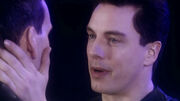
Jack goes in for a kiss with the Ninth Doctor. (TV: The Parting of the Ways)
Indeed, although he rejected Jackie Tyler's advances, (TV: Rose) the Ninth Doctor flirtatiously gave Jabe "air from [his] lungs" and suggestively told her he had "more where that came from". (TV: The End of the World) He assured Rose Tyler that, in the 900 years of his life, he had at some point "danced". He flirted with Jack Harkness too, proposing to dance with him, (TV: The Doctor Dances) and promising to give him what Rose Tyler had with Mickey Smith should Jack buy him a drink. (TV: Boom Town) He did not protest a goodbye kiss from the man. One of the Ninth Doctor's final actions was saving Rose with a kiss; the excess vortex energy was transferred to him through the contact. (TV: The Parting of the Ways) After getting stranded in the year 200,100 and teleporting to the late 19th century, Jack promised, "First I'm gonna kiss him, and then I'm gonna kill him." (TV: Fragments)
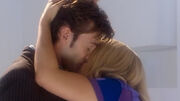
The Tenth Doctor told Sally Sparrow that he was rubbish at weddings, especially his own. (TV: Blink) He also shared a kiss with companions Rose Tyler, (PROSE: The Stone Rose) Martha Jones (TV: Smith and Jones) and Donna Noble (TV: The Unicorn and the Wasp) — as well as Jackie Tyler, (TV: Army of Ghosts) Madame de Pompadour, (TV: The Girl in the Fireplace) Astrid Peth, (TV: Voyage of the Damned) Joan Redfern, (TV: Human Nature) Christina de Souza, (TV: Planet of the Dead) Queen Elizabeth I, and a Zygon duplicate of the same Queen. (TV: The Day of the Doctor) Soon after his regeneration, he was glad to find that he "still got it" after Cassandra O'Brien, in Rose Tyler's body, kissed him enthusiastically. (TV: New Earth) He gave both Martha and Frank the option of kissing him later, as he was busy at the time trying to defeat the Daleks. (TV: Daleks in Manhattan) Though Martha fancied him, (TV: Partners in Crime) he did not return the favour. She told John Smith, "[the Doctor] is everything to me, and he doesn't even look at me, but I don't care, because I love him to bits, and I hope to God he won't remember me saying this." (TV: The Family of Blood) She spent all of her travels "pining after him", and ultimately left the TARDIS to "get out" of what she considered a one-way relationship. (TV: Last of the Time Lords)
Near the end of his tenth incarnation, he accidentally proposed to Elizabeth I, believing her to be a Zygon, and followed through with the proposal by marrying her so he could stop the Zygon invasion. (TV: The Day of the Doctor) He told Ood Sigma that the marriage was a mistake, stopped just short of telling Ood Sigma that her nickname, "the Virgin Queen", was no longer accurate. (TV: The End of Time)
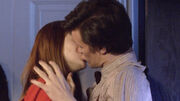
Amy kisses the Eleventh Doctor against his will. (TV: Flesh and Stone)
The Eleventh Doctor fought off Amy Pond's attempts to have sex with him. She did get as far as kissing him, (TV: Flesh and Stone) which he enjoyed; he later expressed to Rory Williams, though, that it was incidental, and it should have been him in his place. (TV: The Vampires of Venice)
He accidentally became engaged to Marilyn Monroe, married her, and later claimed the marriage wasn't valid due to the venue. (TV: A Christmas Carol) Though he was married to — and was implied to have an active sexual life with — River Song, (TV: The Wedding of River Song) the Doctor's eleventh incarnation had zero issue with kissing Rory Williams on two occasions, (TV: The Pandorica Opens, Dinosaurs on a Spaceship) and nearly kissing Craig Owens on another. In fact, the Doctor and Craig were mistaken for a married couple by Val, who took Alfie as their baby. She said, "it's nice for a baby to have two daddies who love each other." (TV: Closing Time)
The original Clara Oswald could not imagine having a sexual relationship with the Eleventh Doctor, (TV: Hide) while her Victorian copy kissed him soon after meeting him. She claimed he blushed. (TV: The Snowmen) After Clara told stories of a non-existent boyfriend to her family, she was forced to invite the Doctor over, pretending to be dating her. The Doctor enthusiastically agreed: "Ding-dong! Okay, brilliant. I'm maybe a bit... rusty in some areas, but I will glance at a manual." He also displayed attraction to her at times, and Clara, under the influence of a Truth Field, admitted she fancied him. (TV: The Time of the Doctor) Following his regeneration, the Twelfth Doctor indicated that his predecessor had seen himself as Clara's boyfriend, something that he made clear he did not continue, seeing it as a mistake. (TV: Deep Breath) This incarnation was not as affectionate as his previous self, even finding hugs awkward.[source needed]
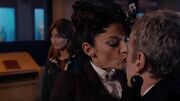
Missy Kisses The Doctor - Dark Water - Doctor Who - BBC
Missy kisses the Twelfth Doctor. (TV: Dark Water)
Upon meeting him, Missy kissed the Twelfth Doctor passionately. His reaction: a fearful "Clara, is it over now?" (TV: Dark Water) He later quickly returned the favour in thanks. (TV: Death in Heaven)
The Twelfth Doctor thought of kissing, "As an activity, it's not hugely varied," asking, "Doesn't it get dull after a while?" (TV: The Husbands of River Song) River Song told him she'd let him know what she thought of his new body after she'd seen more of it than just his face. (TV: The Husbands of River Song)
Behind the scenes
"No hanky-panky in the TARDIS"
Because it was generally considered a children's programme, Doctor Who stayed away from topics such as sexuality from its birth. William Hartnell, who played the First Doctor, specified that the show had "no sex or swearing" in a 1964 interview. (REF: The First Doctor Handbook) In fact, aside from Susan falling in love with David Campbell in The Dalek Invasion of Earth and Jo Grant marrying Clifford Jones in The Green Death, sexuality and even love were barely themes in the early decades of the show.
In fact, the Doctor Who production team often went out of their way to make sure sexuality could not even be construed. An early example of this is the 8 July 1963 decision to make Susan the Doctor's granddaughter, to avoid any possible sexual connotations of a young girl travelling alone with an old man. (REF: The First Doctor Handbook) In the "monochromatic era" of the show, companions were always accompanied by others in the TARDIS, who served as "chaperones" of sorts.
As times progressed, though, the show slipped further and further away from its non-sexual origins. 1980s producer John Nathan-Turner admitted he introduced Nicola Bryant's Peri Brown mainly for her sex appeal in an attempt to compete with other programmes airing at around the same time. (REF: The Companions) Nevertheless, it was JN-T himself who began what Sixth Doctor actor Colin Baker referred to as "the golden rule": "No hanky-panky in the TARDIS." (REF: The Television Companion) The Doctor's female companions were allowed limited physical contact with the Doctor, and were for a time restricted to non-revealing costumes.
With the return of the show in its BBC Wales incarnation, Doctor Who became far more sexualised, there being less taboos surrounding sexuality by the 21st century. Waris Hussein, who directed the programme's first serial in 1963, criticised this, saying it removed much of the Doctor's mystery.[1] Matt Smith, however, disagreed — "For sure, Karen is hot, so too Billie and Jenna, but is that a bad thing? I don't think so. [...] Look at the history of the show; there were women in Tarzanian outfits, were there not, back in the early days?"[2]
Not quite ready
In an interview included in the DVD release of The Curse of Fenric, writer Ian Briggs revealed that the story's Dr Judson was intended to be — like the man he was based on, Alan Turing — struggling with his homosexuality, but this was ultimately cut as it was not at the time considered appropriate to discuss such topics in a family programme. Briggs instead transformed Turing's frustration at being unable to express his true sexual identity into Judson's frustration at being crippled. (DCOM: The Curse of Fenric)
The "gay agenda"
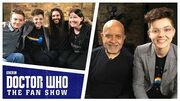
LGBTQ In The Worlds Of Doctor Who - Doctor Who The Fan Show
Christel Dee, Bethany Black, Benjamin Cook and Waris Hussein talk about LGBTQ in Doctor Who.
Sexuality was approached fairly often, though, in Doctor Who novels released in the 1990s, and the Doctor received his first televised non-heterosexual companion in 2005 in the form of Captain Jack Harkness. From then on, the programme — not to mention its more adult-oriented spin-off, Torchwood, with Jack in the lead — contained many references to all sexual orientations, and demonstrated the evolution of views towards homosexuality in the future. Some critics have called this show runner Russell T Davies' "gay agenda" — a phrase which Davies himself in an interview called "abhorrent".[3] His intention was not in fact to rally homosexuality, but rather to express that, in his own words, "sexuality is fluid".[4]
Steven Andrew, then Head of Drama and Acquisitions for CBBC, also requested that Davies put a gay character in The Sarah Jane Adventures, in an attempt to introduce a "normal" gay teenager into children's television. Before the show's cancellation, the plan was to have Luke Smith come out and eventually have a boyfriend, Sanjay. (DCOM: Death of the Doctor) [5]
The Doctor: asexual?
The question of the Doctor's sexuality was a controversial one. It was fanon for decades that he was asexual; fans used the Fourth Doctor's line in City of Death that Countess Scarlioni was "probably" beautiful as proof. Sixth Doctor actor Colin Baker agreed with this theory, saying, "Love is a human emotion and the Doctor isn't human." (REF: The Television Companion) Both Matt Smith[6] and Tom Baker (DOC: Getting Blood from the Stones) have identified that their respective Doctors are asexual and clueless to human sexuality; both exploited this for visual humour.
It was therefore heavily controversial when the Eighth Doctor, in the words of Steven Moffat, "hit puberty" (DOC: The Doctors Revisited - The Eighth Doctor) and shared his first kiss with Grace Holloway in the 1996 tele-film. Moffat was in fact completely against the fan theory of the Doctor's celibacy, saying in an online forum in 1996 that it "flies directly in the face of established continuity".[7]
From the TV movie on, the Doctor had an active sexual and romantic life in the BBC Eighth Doctor Adventures and the BBC Wales version of Doctor Who.
River Song
Steven Moffat has revealed on Twitter that River Song, coming from the same 51st century as Jack Harkness, is just as omnisexual.[8]
Footnotes
- ↑ Jones, Paul (8 April 2013). New Doctor Who his lost his mystery says original director Waris Hussein. Radio Times. Retrieved on 17 December 2013.
- ↑ Jefferies, Mark (11 November 2013). Doctor Who 50th anniversary: Matt Smith hits back at claims the show is too sexy but admit it hires 'hot female actresses. The Mirror. Retrieved on 17 December 2013.
- ↑ Tate, Gabriel (2 April 2009). Russell T Davies: interview. Time Out. Retrieved on 17 December 2013.
- ↑ Winehouse, Alex (21 June 2011). Torchwood, Doctor Who Crossover Rumour Denied. Gigwise. Retrieved on 17 December 2013.
- ↑ Hypable Staff (5 July 2013). Russell T. Davies dishes on 'The Doctor Who' spin-off: 'The Sarah Jane Adventures'. Hypable. Retrieved on 17 December 2013.
- ↑ Reynolds, Andrew (16 July 2011). Smith: 'Doctor Prefers to Play Chess'. Kasterborous. Retrieved on 17 December 2013.
- ↑ Moffat, Steven (10 February 1996). Sex and The Doctor. Google Groups. Retrieved on 17 December 2013.
- ↑ Hogan, Heather (14 May 2012). "Doctor Who" boss reveals River Song is bisexual, "Desperate Housewives" boss slaps lesbian fans in the face on the way out the door. AfterEllen.com. Retrieved on 17 May 2012.
